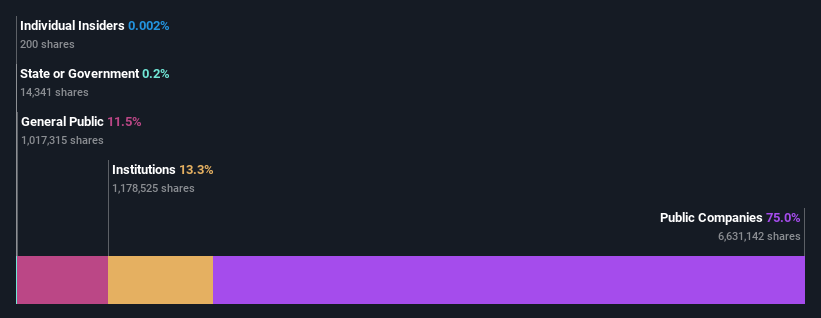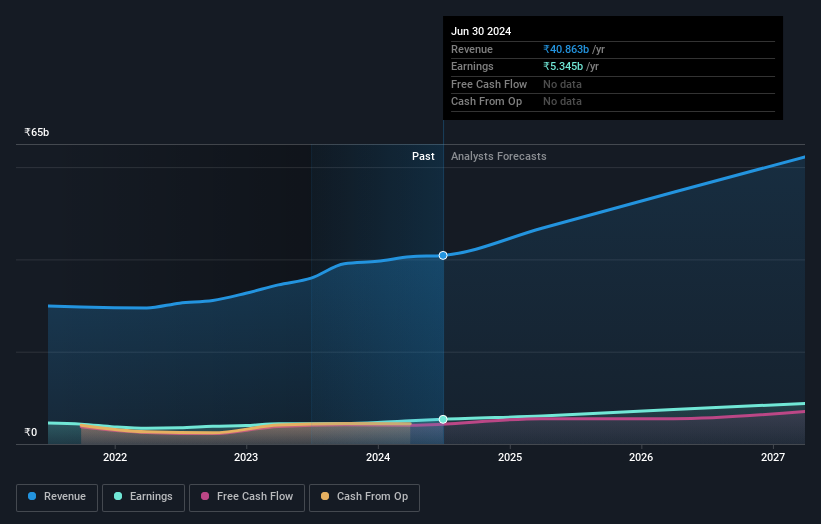- India
- /
- Electronic Equipment and Components
- /
- NSEI:HONAUT
Honeywell Automation India Limited (NSE:HONAUT) most popular amongst public companies who own 75% of the shares, institutions hold 13%
Key Insights
- The considerable ownership by public companies in Honeywell Automation India indicates that they collectively have a greater say in management and business strategy
- 75% of the company is held by a single shareholder (Honeywell International Inc.)
- Institutional ownership in Honeywell Automation India is 13%
If you want to know who really controls Honeywell Automation India Limited (NSE:HONAUT), then you'll have to look at the makeup of its share registry. And the group that holds the biggest piece of the pie are public companies with 75% ownership. In other words, the group stands to gain the most (or lose the most) from their investment into the company.
Institutions, on the other hand, account for 13% of the company's stockholders. Insiders often own a large chunk of younger, smaller, companies while huge companies tend to have institutions as shareholders.
Let's delve deeper into each type of owner of Honeywell Automation India, beginning with the chart below.
Check out our latest analysis for Honeywell Automation India

What Does The Institutional Ownership Tell Us About Honeywell Automation India?
Many institutions measure their performance against an index that approximates the local market. So they usually pay more attention to companies that are included in major indices.
As you can see, institutional investors have a fair amount of stake in Honeywell Automation India. This implies the analysts working for those institutions have looked at the stock and they like it. But just like anyone else, they could be wrong. When multiple institutions own a stock, there's always a risk that they are in a 'crowded trade'. When such a trade goes wrong, multiple parties may compete to sell stock fast. This risk is higher in a company without a history of growth. You can see Honeywell Automation India's historic earnings and revenue below, but keep in mind there's always more to the story.

Honeywell Automation India is not owned by hedge funds. Honeywell International Inc. is currently the largest shareholder, with 75% of shares outstanding. This essentially means that they have extensive influence, if not outright control, over the future of the corporation. Nippon Life India Asset Management Limited is the second largest shareholder owning 2.9% of common stock, and Aditya Birla Sun Life AMC Limited holds about 1.9% of the company stock.
While it makes sense to study institutional ownership data for a company, it also makes sense to study analyst sentiments to know which way the wind is blowing. There are plenty of analysts covering the stock, so it might be worth seeing what they are forecasting, too.
Insider Ownership Of Honeywell Automation India
While the precise definition of an insider can be subjective, almost everyone considers board members to be insiders. Company management run the business, but the CEO will answer to the board, even if he or she is a member of it.
I generally consider insider ownership to be a good thing. However, on some occasions it makes it more difficult for other shareholders to hold the board accountable for decisions.
Our most recent data indicates that insiders own less than 1% of Honeywell Automation India Limited. It's a big company, so even a small proportional interest can create alignment between the board and shareholders. In this case insiders own ₹10m worth of shares. It is always good to see at least some insider ownership, but it might be worth checking if those insiders have been selling.
General Public Ownership
With a 12% ownership, the general public, mostly comprising of individual investors, have some degree of sway over Honeywell Automation India. While this group can't necessarily call the shots, it can certainly have a real influence on how the company is run.
Public Company Ownership
It appears to us that public companies own 75% of Honeywell Automation India. It's hard to say for sure but this suggests they have entwined business interests. This might be a strategic stake, so it's worth watching this space for changes in ownership.
Next Steps:
It's always worth thinking about the different groups who own shares in a company. But to understand Honeywell Automation India better, we need to consider many other factors.
Many find it useful to take an in depth look at how a company has performed in the past. You can access this detailed graph of past earnings, revenue and cash flow.
If you would prefer discover what analysts are predicting in terms of future growth, do not miss this free report on analyst forecasts.
NB: Figures in this article are calculated using data from the last twelve months, which refer to the 12-month period ending on the last date of the month the financial statement is dated. This may not be consistent with full year annual report figures.
Valuation is complex, but we're here to simplify it.
Discover if Honeywell Automation India might be undervalued or overvalued with our detailed analysis, featuring fair value estimates, potential risks, dividends, insider trades, and its financial condition.
Access Free AnalysisHave feedback on this article? Concerned about the content? Get in touch with us directly. Alternatively, email editorial-team (at) simplywallst.com.
This article by Simply Wall St is general in nature. We provide commentary based on historical data and analyst forecasts only using an unbiased methodology and our articles are not intended to be financial advice. It does not constitute a recommendation to buy or sell any stock, and does not take account of your objectives, or your financial situation. We aim to bring you long-term focused analysis driven by fundamental data. Note that our analysis may not factor in the latest price-sensitive company announcements or qualitative material. Simply Wall St has no position in any stocks mentioned.
About NSEI:HONAUT
Honeywell Automation India
Manufactures and sells industrial process control and automation systems in India and internationally.
Flawless balance sheet established dividend payer.
Similar Companies
Market Insights
Community Narratives



